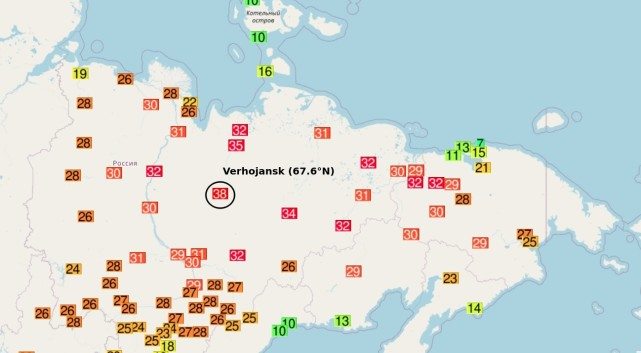(单词翻译:单击)
听力文本
The Arctic Is 'on Fire,' Record Heat Alarms Scientists
Over the weekend, the Russian town of Verkhoyansk in Siberia reported a temperature of 38 degrees Celsius.
The World Meteorological Organization said Tuesday that it is looking to confirm that temperature reading. After all, Siberia is known for being frozen.
Experts are worried about what this record high temperature in the Arctic Circle might mean for the rest of the world.
The environmental group Berkeley Earth reported that from January through May, the average temperature in north-central Siberia was been about 8 degrees Celsius higher than normal. "That's much, much warmer than it's ever been over that region in that period of time," said Berkeley Earth climate scientist Zeke Hausfather.
Jonathan Overpeck is a climate scientist with the University of Michigan. He said "alarm bells should be ringing" because such extended warmth in Siberia has not been seen for thousands of years. In an email to The Associated Press, Overpeck described the Arctic as "on fire."
"It's warming much faster than we thought it would in response to rising levels of carbon dioxide and other greenhouse gases in the atmosphere," he wrote.
The temperature on Earth has been growing, on average, by 0.18 degrees Celsius every 10 years. In the Russian Arctic Circle, it has been increasing by 0.69 degrees Celsius, said Andrei Kiselyov. He is the lead scientist at the Moscow-based Voeikov Main Geophysical Observatory.

The increasing temperatures in Siberia have been linked to wildfires and the melting of ice on land forms known as permafrost. The melting permafrost, in turn, releases more heat-trapping gas, dries out soil and increases wildfires.
"In this case it's even more serious, because the previous winter was unusually warm," said Vladimir Romanovsky, who studies permafrost at the University of Alaska Fairbanks.
A recent oil spill near the Arctic city of Norilsk was partly blamed on melting permafrost. Last August, more than 4 million hectares of forests in Siberia were on fire. And, fires are burning already in the Arctic, ahead of the usual fire season start in July, said Vladimir Chuprov of the environmental group Greenpeace Russia.
The warm weather, wildfires and melting of permafrost affect global warming by releasing large amounts of methane, a greenhouse gas, into the atmosphere. Methane is 28 times stronger than carbon dioxide.
Marina Makarova is chief meteorologist at Russian weather agency Rosgidromet. She said the temperature in Verkhoyansk remained unusually high from last Friday through Monday.
Makarova added, "The ground surface heats up intensively...The nights are very warm, the air doesn't have time to cool and continues to heat up for several days."
For those who live in the Russian Arctic Circle, a heat wave has its good side. Vasilisa Ivanova spent every day this week swimming and sunbathing with her family.
"We spend the entire day on the shore of the Lena River," said Ivanova, who lives in the village of Zhigansk, about 430 kilometers from where the heat record was set.
I'm Caty Weaver.
重点解析
重点讲解:
1. on fire 着火;起火;在燃烧;
The captain radioed that the ship was on fire.
船长发无线电说船着火了。
2. on average 平均起来;按平均值;
On average each report requires 1,000 hours to prepare.
准备一份报告平均需要1,000小时。
3. in turn 继而;转而;反过来;
Increased production will, in turn, lead to increased profits.
增加生产会继而增加利润。
4. heat up 变热;
In the summer her mobile home heats up like an oven.
夏天一到,她的活动住房就变得像烤炉一样热。
参考译文
北极"着火了" 创记录高温令科学家忧心不已
上周末,位于西伯利亚地区的俄罗斯小镇维科扬斯克的气温达到38摄氏度。
世界气象组织周二表示,他们正在努力确认这一温度读数。毕竟,西伯利亚以冰冻著称。
这一北极圈内的创记录高温对世界其他地区的意义令专家感到担心。
环境组织“伯克利地球”报告称,从1月至5月,西伯利亚中北部地区的平均气温比正常值高出约8摄氏度。伯克利地球组织的气候科学家泽克·豪斯法瑟表示,“这一温度比那段时期该地区以往的温度都要高出很多。”
乔纳森·奥弗帕克是密歇根大学的气候科学家。他表示,“应该敲响警钟”,因为西伯利亚数千年来从未出现过如此温暖的气候。在发给美联社的电邮中,奥弗帕克称北极“着火了”。
他写道,“随着大气中二氧化碳和其他温室气体水平的不断上升,气候变暖的速度远比我们想象的要快得多。”
地球温度平均每10年升高0.18摄氏度。安德烈·基塞约夫表示,俄罗斯北极圈的温度已经上升了0.69摄氏度。他是莫斯科沃耶伊科夫地球物理主观测站的首席科学家。
西伯利亚地区不断升高的气温与野火以及“永久冻土”地貌上的冰融化有关。而融化的永久冻土会释放出更多热量,使土壤干燥,野火增多。
在阿拉斯加大学费尔班克斯分校研究永久冻土的弗拉基米尔·罗曼诺夫斯基表示,“如果是这样,情况会更加严重,因为前一个冬天异常温暖。”
最近北极城市诺里尔斯克附近发生的石油泄漏事件,部分要归咎于永久冻土融化。去年8月,西伯利亚地区超过400万公顷森林起火。环境组织“绿色和平俄罗斯”的弗拉基米尔·丘普罗夫表示,在7月份火灾高发季来临之前,大火已经在北极地区燃烧。
温暖的天气、野火和永久冻土融化通过向大气释放大量的温室气体甲烷,来影响全球变暖。甲烷的威力比二氧化碳强28倍。
玛丽娜·马卡洛娃是俄罗斯气象局的首席气象学家。她表示,从上周五到周一,维科扬斯克的气温一直保持在异常高的水平。
马卡洛娃补充说,“地表温度大幅升高,夜晚非常温暖,空气没有时间降温,连续数天升温。”
对居住在俄罗斯北极圈内的人来说,热浪有其好的一面。瓦西丽莎·伊万诺娃本周每天都和家人一起游泳和晒日光浴。
伊万诺娃说:“我们一整天都在勒拿河岸边度过”,她住在离创下高温记录的地方约430公里的日甘斯克村。
凯蒂·韦弗报道。
译文为可可英语翻译,未经授权请勿转载!


